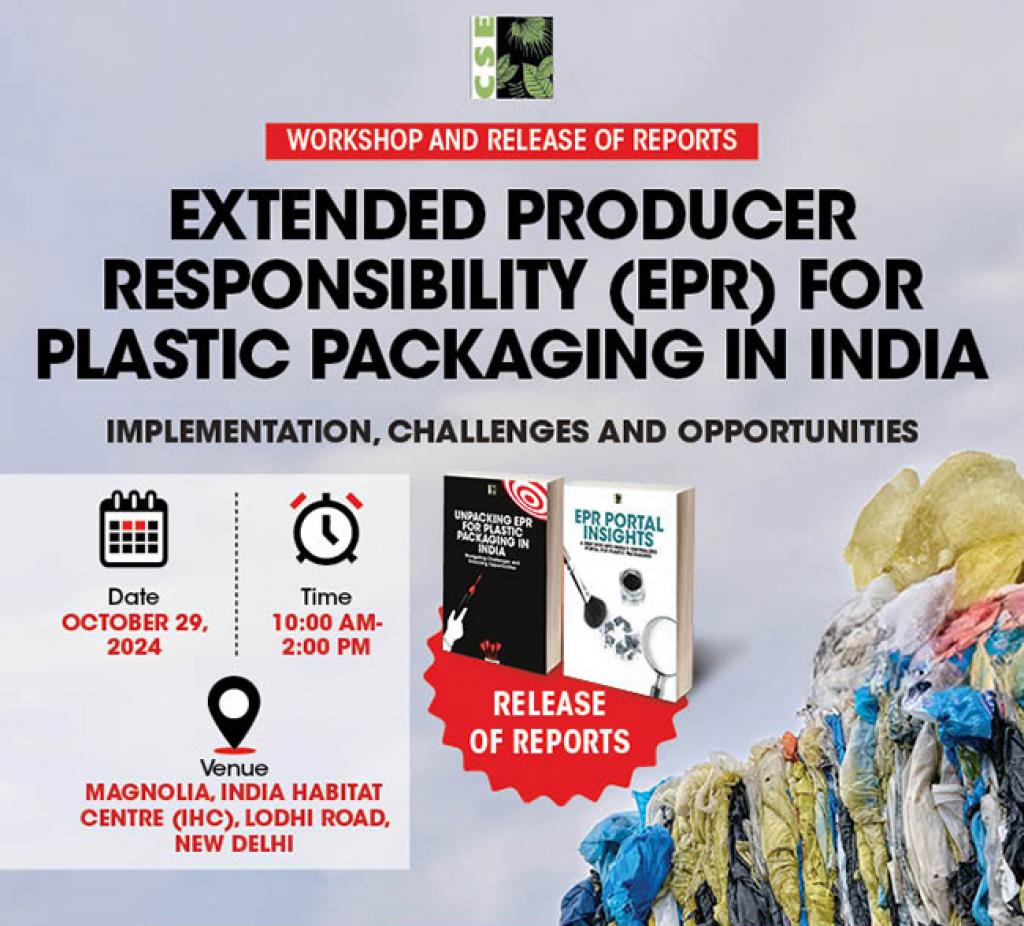Centre for Science and Environment

- 03 Nov 2024
In News:
Centre for Science and Environment release a report on Extended Producer Responsibility (EPR) for Plastic Packaging
Key Findings:
- EPR Guidelines (2022) were a step towards enforcing the "polluter pays" principle, but the system faces significant issues in its implementation and registration processes.
- Centre for Science and Environment (CSE) report, released on October 29, 2024, highlights gaps in the EPR system for plastic packaging and suggests corrective actions.
EPR Guidelines Overview:
- Issued by: Union Ministry of Environment, Forest and Climate Change (MoEFCC).
- Objective: Hold producers, importers, brand owners (PIBOs), and plastic waste processors (PWPs) responsible for managing plastic packaging waste.
- Key Requirements:
- PIBOs must register on a centralized portal and set targets for collection, recycling, and reuse of plastic packaging.
- Registration involves compliance with targets on end-of-life recycling and recycled content usage.
Problems Identified in the Current EPR System:
- Low Registration and Enrollment:
- 41,577 registrations on the EPR portal, but a significant discrepancy in the type of stakeholders registered.
- 83% of registered entities are importers, 11% are producers, and only 6% are brand owners.
- Producers contribute 65% of the plastic packaging in the market but have low registration.
- Absence of Key Polluters:
- Manufacturers of virgin plastics are notably absent from the portal, despite being required to register.
- Fraudulent Practices:
- 700,000 fake certificates were generated by plastic recyclers, far exceeding the actual certificate generation capacity.
- The Central Pollution Control Board (CPCB) found that such fraudulent activities are undermining the integrity of the system.
- For example, end-of-life co-processing units (e.g., cement plants) claimed to have processed 335.4 million tonnes per annum of plastic waste, while their actual capacity is just 11.4 million tonnes per annum.
- Underreporting and Mismanagement:
- Despite 23.9 million tonnes of plastic packaging being introduced into the market, the CPCB’s estimation of plastic waste generation (4.1 MT annually) is underestimated.
- Lack of Stakeholder Representation:
- Urban local bodies and informal waste collectors—key contributors to plastic waste management—are not included in the EPR framework, which limits their incentives and support.
Recommendations for Improvement:
- Incorporate the Informal Sector:
- Recognize informal waste collectors and waste management agencies in the EPR framework to improve traceability and ensure better waste management.
- Eliminate Fraudulent Practices:
- Strict actions need to be taken against fraudulent recyclers and fake certificate issuers to restore credibility to the EPR system.
- Establish Fair Pricing for EPR Certificates:
- Undertake baseline cost studies to determine the true costs of plastic waste management, ensuring fair pricing for recycling certificates and preventing undervaluation.
- Standardize Packaging:
- Focus on product standardization to ensure that packaging materials are uniform and easily recyclable.
- Strengthen Monitoring:
- Improve oversight on the registration process and ensure that all polluters (producers, importers, brand owners) comply with the system’s guidelines.
EPR and Plastic Waste Management: Context and Importance
- Extended Producer Responsibility (EPR) is a policy approach where the responsibility of managing the entire lifecycle of plastic products (from production to disposal) lies with the producer.
- It is an essential part of India’s Plastic Waste Management Rules (2016), which mandate the recycling and proper disposal of plastic packaging waste.
Key Elements of EPR:
- Producer Accountability: Producers are responsible for the take-back, recycling, and final disposal of plastic packaging.
- Waste Minimization: Encourages reducing waste at the source by promoting sustainable packaging designs.
- Lifecycle Approach: Considers the entire lifecycle of the product, focusing on sustainability from production to disposal.
- Polluter Pays Principle: Ensures that the cost of waste management is borne by those responsible for generating the waste.
